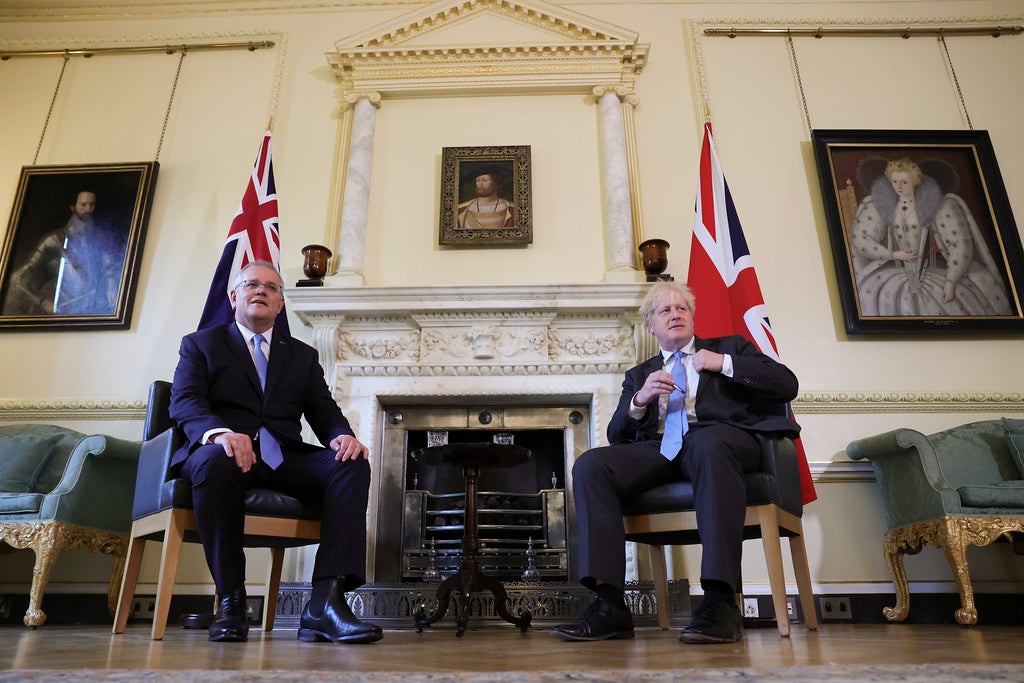
The UK and Australia have signed a trade deal after months of negotiations – with British farmers and campaigners hitting out at the agreement.
London said the “historic” deal – the first trade agreement signed “from scratch” since the UK left the EU – is “expected to unlock GBP10.4bn (US$13.85bn) of additional trade, boosting our economy and increasing wages across the UK, while eliminating tariffs on 100% of UK exports”.

Discover B2B Marketing That Performs
Combine business intelligence and editorial excellence to reach engaged professionals across 36 leading media platforms.
In Canberra, the Australian government highlighted what it saw as the benefits of the deal for producers of beef, sheep meat, sugar and wine.
The UK’s National Farmers’ Union (NFU) said the agreement “serves to heap further pressure on farm businesses at a time when they are facing extraordinary inflationary pressure and sustained labour shortages”.
UK food campaign group Sustain argued the agreement “betrays consumers, farmers and the environment”.
The deal was agreed in principle by UK Prime Minister Boris Johnson and Australian counterpart Scott Morrison in June. Negotiators have now finalised all chapters of the agreement.

US Tariffs are shifting - will you react or anticipate?
Don’t let policy changes catch you off guard. Stay proactive with real-time data and expert analysis.
By GlobalDataLondon insisted the accord is also a “gateway into the fast-growing Indo-Pacific region”. The UK government said the deal will boost its bid to join the CPTPP, a trade agreement covering 11 nations bordering the Pacific.
“This agreement is tailored to the UK’s strengths, and delivers for businesses, families, and consumers in every part of the UK,” Anne-Marie Trevelyan, the UK’s International Trade Secretary, said.
Australia said the deal would end tariffs “on over 99%” of goods exports to the UK. For beef, a tariff-free quota of 35,000 tonnes will be expanded to 110,000 tonnes in the tenth year of the deal. Tariffs on beef will be eliminated after ten years, Canberra said.
Producers of sheep meat will see a tariff-free quota of 25,000 tonnes expand to 75,000 by year ten. Tariffs on sheep meat will then be removed when that year ends.
For sugar, a tariff-free quota of 80,000 tonnes will grow to 220,000 tonnes in the eighth year of the deal. Sugar tariffs will be eliminated after eight years.
Minette Batters, the president of the NFU, said: “We will analyse the detail in full but on the face of it, this is a one-sided deal. When it comes to agriculture, the Australians have achieved all they have asked for and British farmers are left wondering what has been secured for them.
“In particular, it is disappointing that the UK government has capitulated to Australian demands to time-limit any safeguards for sensitive sectors. Despite assurances that these sectors would be afforded some level of protection, we will see full liberalisation of dairy after just six years, sugar after eight years and beef and lamb after 15 years.”
Vicki Hird, head of farming at Sustain, hit out at what she saw as the environmental disadvantages of expanding Australia’s access to the UK market.
“Australian farmers can use feedlots, battery cages and sow stalls. The government permits the use of hormones and antibiotics to speed up growth as well as the removal of skin from live sheep. They licence almost double the number of highly hazardous pesticides as the UK,” she tweeted today.
BREAKING: UK signs first post Brexit deal with Australia. @vickihird responds: “This deal betrays consumers, farmers and the environment. /1
— Sustain (@UKSustain) December 16, 2021
Prof. Tim Lang, Professor Emeritus of Food Policy at City University of London, also took to Twitter to question the economic benefits of the agreement.
UK Govt hails new UK-Australia trade deal as “world-class”. Might regret that. (a) it’s tiny; estimated to raise UK GDP by only £2.3bn by 2035 (0.08%) https://t.co/W1YfA8XvlL (b) lose EU, gain Aus? c) trouble ahead if imports of Aussie hormone-reared beef https://t.co/4gzD5ftmBE
— Professor Tim Lang (@ProfTimLang) December 17, 2021
Trevelyan added: “Today we demonstrate what the UK can achieve as an agile, independent sovereign trading nation. This is just the start as we get on the front foot and seize the seismic opportunities that await us on the world stage.”





